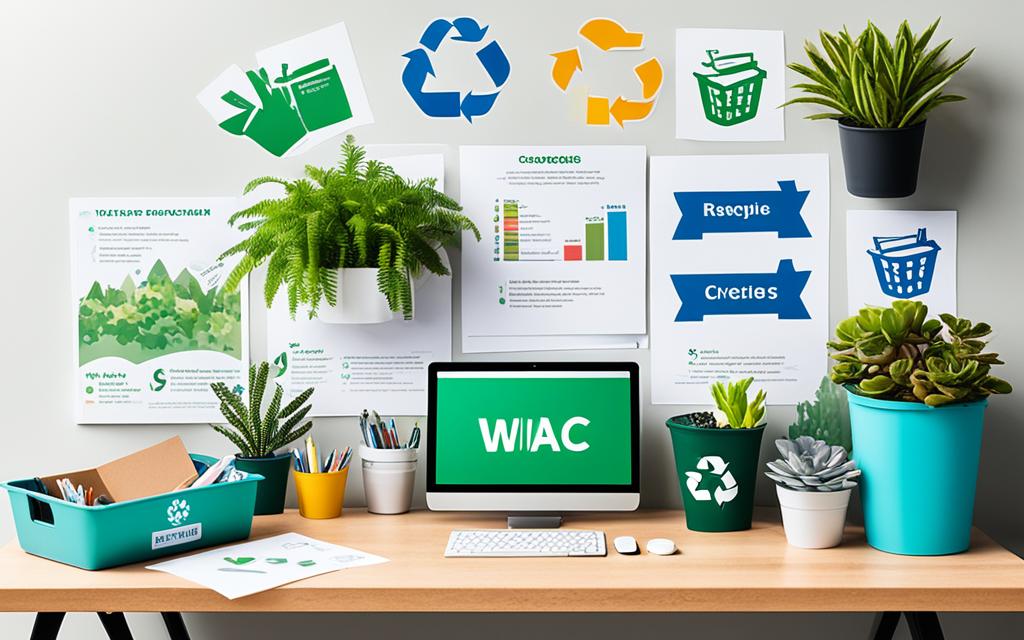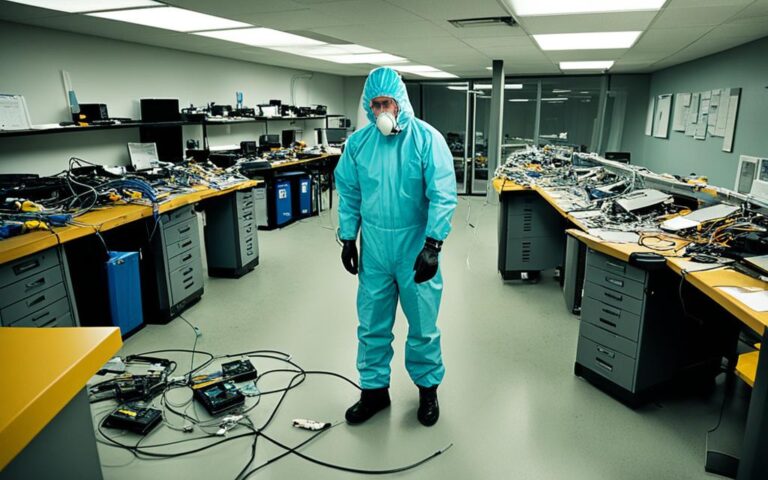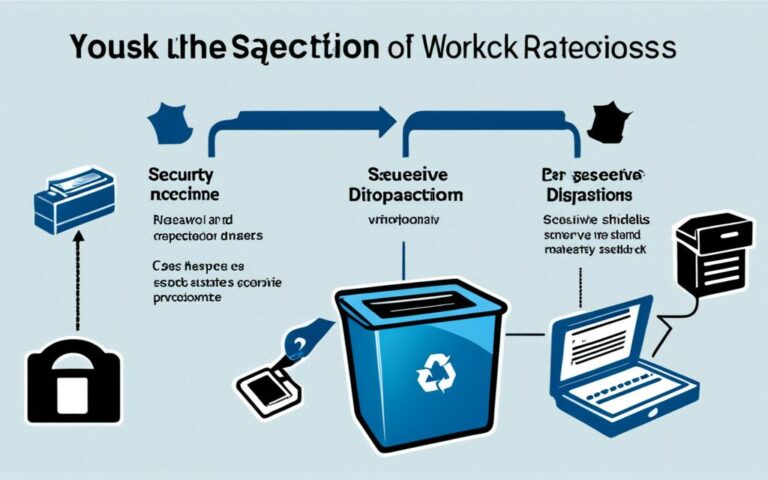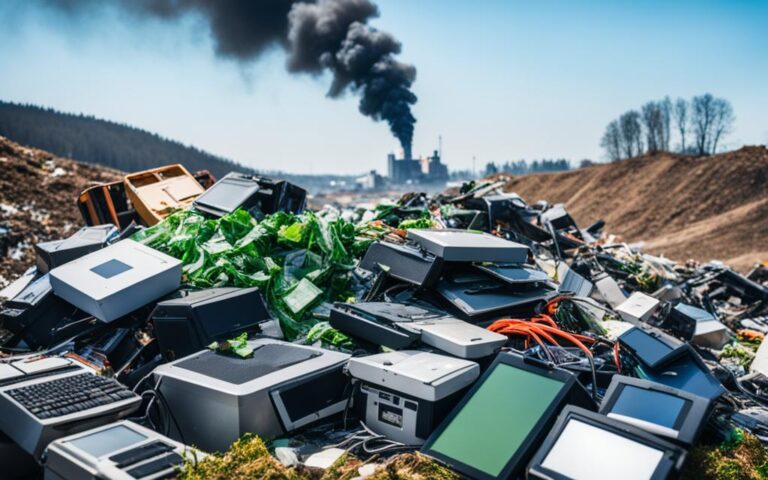Leading the Way with Desktop Recycling Initiatives
Recycling initiatives for desktop computers play a crucial role in promoting sustainability and waste reduction in the workplace. These initiatives focus on the entire lifecycle of a computer, from manufacturing and production to end-of-life disposal. By implementing sustainable practices, businesses can not only reduce their carbon footprint but also achieve long-term cost savings.
Let’s explore the different stages of a computer’s lifecycle and the environmental impact associated with each stage.
The Lifecycle of a Computer
The lifecycle of a computer can be divided into four main stages: manufacturing and production, distribution and retail, usage, and end-of-life and disposal. Each stage plays a crucial role in sustainable computing and has unique environmental implications.
Manufacturing and Production: This stage involves the sourcing and processing of raw materials to create computer components. It requires significant energy consumption and can lead to potential waste and pollution. Sustainable manufacturing practices, such as using renewable energy sources and reducing waste, can mitigate the environmental impact.
Distribution and Retail: During this stage, computers are transported and packaged for retail. The transportation process contributes to carbon emissions, and packaging materials generate waste. Implementing eco-friendly packaging materials and optimizing transportation routes can help reduce the environmental impact.
Usage: The usage stage includes the operation of computers and the energy consumed by data centers. Electricity consumption is a significant environmental concern, but adopting energy-efficient practices, using renewable energy sources, and practicing regular maintenance can help minimize the impact.
End-of-life and Disposal: At the end of its lifecycle, a computer can either contribute to environmental contamination or undergo proper recycling and disposal. Irresponsible disposal can lead to hazardous substances entering the environment, while recycling and resource recovery can promote sustainability. Proper e-waste management is essential to minimize the environmental impact.
Understanding and addressing each stage of a computer’s lifecycle is crucial for sustainable computing. By implementing sustainable practices at every stage, we can reduce the overall environmental impact and contribute to a more sustainable future.
| Stage | Environmental Implications |
|---|---|
| Manufacturing and Production | Energy consumption Potential waste and pollution |
| Distribution and Retail | Carbon emissions from transportation Waste generation from packaging |
| Usage | Electricity consumption Energy consumed by data centers |
| End-of-life and Disposal | Potential environmental contamination Recycling and resource recovery opportunities |
Environmental Impact at Each Stage
The lifecycle of a computer involves various stages that have a significant environmental impact. Let’s explore the environmental implications associated with each stage: manufacturing and production, distribution and retail, usage, and end-of-life and disposal.
Manufacturing and Production
The manufacturing and production stage of a computer has a profound environmental impact. It involves the extraction and processing of raw materials, which consumes a large amount of energy. Additionally, this stage can contribute to land degradation and water pollution. To minimize the environmental impact, companies can focus on using renewable energy sources, reducing waste through efficient design, and minimizing the use of harmful chemicals.
Distribution and Retail
The distribution and retail stage of a computer’s lifecycle also have a significant environmental impact. This stage contributes to carbon emissions through transportation and generates waste from packaging materials. To mitigate these environmental effects, businesses can optimize transportation routes, use electric or hybrid vehicles, and opt for eco-friendly packaging materials.
Usage
The usage stage of a computer involves electricity consumption and the energy consumed by data centers. This stage contributes to the overall environmental impact. To make this stage more sustainable, individuals and organizations can adopt energy-efficient practices, utilize renewable energy sources, and practice regular maintenance to optimize energy consumption.
End-of-Life and Disposal
The end-of-life and disposal stage of a computer’s lifecycle is critical in determining its environmental impact. Improper disposal can result in harmful substances entering the environment. However, responsible end-of-life management practices can help promote recycling and resource recovery, reducing the environmental impact. It is important to ensure proper recycling practices to prevent pollution and conserve valuable resources.
By understanding the environmental impact at each stage of a computer’s lifecycle, we can make informed decisions to minimize our ecological footprint. Sustainable practices can help us reduce energy consumption, waste generation, and pollution. Let’s strive for a more environmentally conscious approach to computing.
Sustainable Practices for Each Stage
To mitigate the environmental impact of each stage of a computer’s lifecycle, it is essential to adopt sustainable practices. By implementing sustainable practices, businesses can contribute to the reduction of carbon footprint and waste. Let’s explore the sustainable practices that can be adopted at each stage of the computer’s lifecycle:
1. Manufacturing and Production Stage
In the manufacturing and production stage, companies can focus on:
- Using renewable energy sources during the manufacturing process to reduce energy consumption and carbon emissions.
- Implementing efficient design strategies to reduce material waste and increase resource efficiency.
- Minimizing the use of harmful chemicals and opting for environmentally friendly alternatives.
2. Distribution and Retail Stage
During the distribution and retail stage, companies can adopt the following sustainable practices:
- Optimizing transportation routes to minimize carbon emissions and reduce the overall environmental impact of transportation.
- Using electric or hybrid vehicles for transportation to reduce air pollution and dependence on fossil fuels.
- Utilizing eco-friendly packaging materials that are recyclable or made from sustainable sources.
3. Usage Stage
To make the usage stage more sustainable, individuals and businesses can consider the following practices:
- Adopting energy-efficient practices such as using power-saving settings on computers and turning off devices when not in use.
- Using renewable energy sources, such as solar or wind power, to power the computers and minimize reliance on fossil fuels.
- Maintaining computers regularly to ensure optimal performance and prolong their lifespan.
4. End-of-Life and Disposal Stage
Responsible end-of-life management is crucial to prevent harmful substances from entering the environment and promote resource conservation. Sustainable practices for end-of-life and disposal include:
- Properly recycling computers through certified e-waste recycling facilities to recover valuable materials and reduce landfill waste.
- Promoting the reuse and refurbishment of still functional computers to extend their lifespan and reduce electronic waste.
- Implementing safe and secure data destruction processes to protect sensitive information during disposal.
By adopting sustainable practices at each stage of a computer’s lifecycle, businesses and individuals can contribute to a more environmentally friendly and resource-efficient computing industry.
Success Stories in Sustainable Computing
When it comes to sustainable computing, success stories abound, showcasing the positive impact of recycling initiatives. From tech giants to government interventions, and grassroots movements to educational institutions, various entities are actively contributing to the cause of sustainable computing.
Tech Companies: Apple and Dell
In the realm of sustainable manufacturing, tech companies like Apple and Dell are leading the charge. They have made significant commitments towards carbon neutrality and incorporated recycled materials in their products. By prioritizing sustainable practices in their supply chains, these companies are setting a remarkable example for others to follow.
Government Initiatives: China’s Green IT Practices
Government interventions can play a vital role in promoting sustainable computing. One such example is China’s emphasis on Green IT practices. The Chinese government has implemented organizational interventions to encourage the adoption of green practices in the tech industry. These initiatives aim to reduce environmental impact and foster a more sustainable approach to computing.
Grassroots Movements: Raising Awareness and Organizing E-waste Collection
In addition to corporate and governmental efforts, grassroots movements are making significant contributions to sustainable computing. These movements focus on raising awareness among individuals and communities about the importance of responsible e-waste management. They also actively organize e-waste collection drives, ensuring the proper disposal and recycling of electronic devices.
Educational Institutions: Collaboration and Sustainability Integration
Educational institutions are actively collaborating with tech companies to develop sustainable computing solutions. By integrating sustainability into their operational strategies, these institutions are equipping the next generation of tech professionals with the knowledge and skills necessary to create a more environmentally friendly digital landscape.
Overall, the success stories in sustainable computing demonstrate the power of collective action and highlight the diverse efforts being made to address the environmental challenges associated with technology. Through collaboration between tech companies, government interventions, grassroots movements, and educational institutions, we can pave the way towards a greener and more sustainable future.
Stay tuned for more inspiring examples and practical steps you can take to contribute to sustainable computing!
Rootcommunication: Leading the Way in Server Recycling and Collection
Rootcommunication is paving the way for eco-friendly solutions in server recycling and collection. As the lifecycles of servers continue to shorten, the e-waste challenge becomes increasingly critical. Rootcommunication takes a comprehensive approach to server recycling and reclamation, addressing data security, parts organization for recycling and reuse, and responsible disposal of non-recyclable materials.
Ensuring data security is paramount in Rootcommunication’s server recycling process. Through proper data erasure techniques, they guarantee the protection of sensitive information and maintain clients’ peace of mind. Rootcommunication’s commitment to data security aligns with their eco-friendly approach, prioritizing sustainability throughout their operations.
Server dismantling and parts organization play a vital role in Rootcommunication’s server reclamation efforts. By disassembling servers and categorizing the components for recycling and reuse, the company maximizes resource recovery. This approach minimizes waste and contributes to the conservation of valuable materials, further promoting their eco-friendly initiatives.
Responsible disposal of non-recyclable materials is another key aspect of Rootcommunication’s server recycling process. By ensuring the proper management of non-recyclable components, such as hazardous substances and materials, the company mitigates the potential environmental impact associated with e-waste disposal. Rootcommunication’s commitment to eco-friendly solutions extends beyond recycling, encompassing the responsible management of all aspects of server disposal.
Rootcommunication’s efforts in server recycling and collection not only contribute to environmental preservation but also offer financial benefits to businesses. By implementing efficient server recycling practices, companies can potentially reduce costs associated with the disposal of outdated servers. Additionally, Rootcommunication’s focus on data security provides businesses with peace of mind, reinforcing trust and confidence in their eco-friendly services.
In summary, Rootcommunication sets the benchmark for eco-friendly solutions in server recycling and collection. Through their emphasis on data security, parts organization, and responsible disposal, they address the e-waste challenge with a comprehensive and sustainable approach. By partnering with Rootcommunication, businesses can contribute to environmental preservation, achieve financial benefits, and ensure data security, all while promoting a circular economy and setting a positive example for server recycling.
The Fixy Project: Promoting Repair, Reuse, and Recycling
The Fixy project in Somerset is dedicated to promoting repair, reuse, and recycling as essential practices for a sustainable future. Through various initiatives, Fixy strives to educate and raise awareness about the importance of sustainable consumption while engaging new audiences in the process.
One of the key activities of the Fixy project is outreach. By organizing workshops, events, and educational campaigns, Fixy aims to empower individuals and communities with the knowledge and skills necessary to repair and reuse their smart technology. Through these initiatives, Fixy encourages people to adopt a more sustainable mindset and make conscious choices about their tech consumption habits.
In addition to outreach, Fixy also supports existing repair groups within the community. By acting as a facilitator and connector, Fixy amplifies the impact of these local repair groups by extending their reach and helping them access a wider audience. Fixy also serves as a platform to pass on potential volunteers’ details, ensuring that repair groups receive the necessary support and resources.
The Fixy project believes that every smart tech device has the potential to be repaired, reused, or recycled, and should not end up as electronic waste. By encouraging repair, we not only reduce electronic waste but also extend the lifespan of devices, saving valuable resources and reducing our ecological footprint. Together, we can make a significant difference through small actions.
Furthermore, Fixy acts as a mobile tech amnesty point, accepting smart tech donations from individuals and businesses. These donated devices are securely wiped of personal data and sent to Donate IT, a partner organization specializing in refurbishing and distributing technology to individuals and communities in need. By facilitating the reuse of smart tech, Fixy ensures that functional devices find new homes instead of ending up in landfills.
The Fixy project is funded by Material Focus, supporting the Recycle Your Electricals campaign. Material Focus is an organization committed to promoting responsible recycling and resource management in the UK. Through this partnership, Fixy is able to carry out its mission effectively and create a positive impact in reducing electronic waste.
Join the Fixy project and be a part of the repair, reuse, and recycling movement. Together, we can create a more sustainable future for our communities and the planet.
Recent Donations to the Fixy Project
| Device | Condition | Donor |
|---|---|---|
| iPhone X | Excellent | John Smith |
| MacBook Pro | Good | Jane Doe |
| Samsung Galaxy S10 | Like New | ABC Company |
These donated devices have been securely wiped of personal data and are undergoing the refurbishment process. Once refurbished, they will be provided to individuals in need, ensuring that functional devices are given a second life.
Conclusion
Initiatives for recycling and promoting sustainability in the workplace are vital for reducing carbon footprint and waste. By understanding the lifecycle of a computer and adopting sustainable practices at each stage, businesses and individuals can contribute to sustainable computing. Success stories in sustainable computing, such as those by tech companies, government initiatives, grassroots movements, and educational institutions, demonstrate the positive impact of recycling initiatives. Companies like Rootcommunication and projects like Fixy are leading the way in server recycling, repair, and recycling in the UK. By supporting these initiatives and implementing responsible e-waste management practices, we can create a more sustainable and ethical digital civilization.
FAQ
What is the importance of recycling initiatives for desktop computers in promoting sustainability in the workplace?
Recycling initiatives for desktop computers play a crucial role in promoting sustainability and waste reduction in the workplace. These initiatives focus on the entire lifecycle of a computer, from manufacturing and production to end-of-life disposal. By implementing sustainable practices, businesses can not only reduce their carbon footprint but also achieve long-term cost savings.
What are the different stages of a computer’s lifecycle and their environmental impact?
The lifecycle of a computer can be divided into four main stages: manufacturing and production, distribution and retail, usage, and end-of-life and disposal. Each stage has unique environmental implications. The manufacturing and production stage involves the sourcing and processing of raw materials, leading to energy consumption and potential waste and pollution. The distribution and retail stage contributes to carbon emissions through transportation and packaging. The usage stage involves electricity consumption and the energy consumed by data centers. Finally, the end-of-life and disposal stage can either contribute to environmental contamination or promote recycling and resource recovery.
How can sustainable practices be adopted for each stage of a computer’s lifecycle?
To mitigate the environmental impact of each stage of a computer’s lifecycle, it is essential to adopt sustainable practices. In the manufacturing and production stage, companies can focus on using renewable energy sources, reducing waste through efficient design, and minimizing the use of harmful chemicals. In the distribution and retail stage, optimizing transportation routes, using electric or hybrid vehicles, and eco-friendly packaging materials can contribute to sustainability. The usage stage can be made more sustainable by adopting energy-efficient practices, using renewable energy sources, and practicing regular maintenance. Responsible end-of-life management involves proper recycling practices to prevent harmful substances from entering the environment and promote resource conservation.
What are some success stories in sustainable computing?
Tech companies like Apple and Dell are leading the way in sustainable manufacturing by committing to carbon neutrality and incorporating recycled materials in their products. Government initiatives, such as those in China, promote green IT practices through organizational interventions. Grassroots movements play a significant role in raising awareness and organizing e-waste collection drives. Educational institutions collaborate with tech companies to develop sustainable computing solutions and integrate sustainability into their operational strategies.
How does Rootcommunication contribute to server recycling and collection?
Rootcommunication is setting the benchmark for eco-friendly solutions in server recycling and collection. With the increasing e-waste challenge caused by the shortening lifecycles of servers, Rootcommunication takes a thorough approach to server recycling and reclamation. This includes ensuring data security through proper data erasure, dismantling servers and organizing parts for recycling and reuse, and responsible disposal of non-recyclable materials. Rootcommunication’s efforts not only contribute to environmental preservation but also offer financial benefits and data security peace of mind.
What is the Fixy Project and how does it promote repair, reuse, and recycling?
The Fixy Project in Somerset promotes repair, reuse, and recycling through outreach, supporting existing repair groups, and accepting smart tech donations. The project educates and raises awareness about sustainable consumption and engages new audiences through its outreach activities. Fixy also amplifies local repair groups by extending their reach and passing on potential volunteers’ details. Additionally, Fixy acts as a mobile tech amnesty point, accepting smart tech donations that are securely wiped and given to Donate IT for refurbishment and distribution to people in need. The project is funded by Material Focus, supporting the Recycle Your Electricals campaign.















